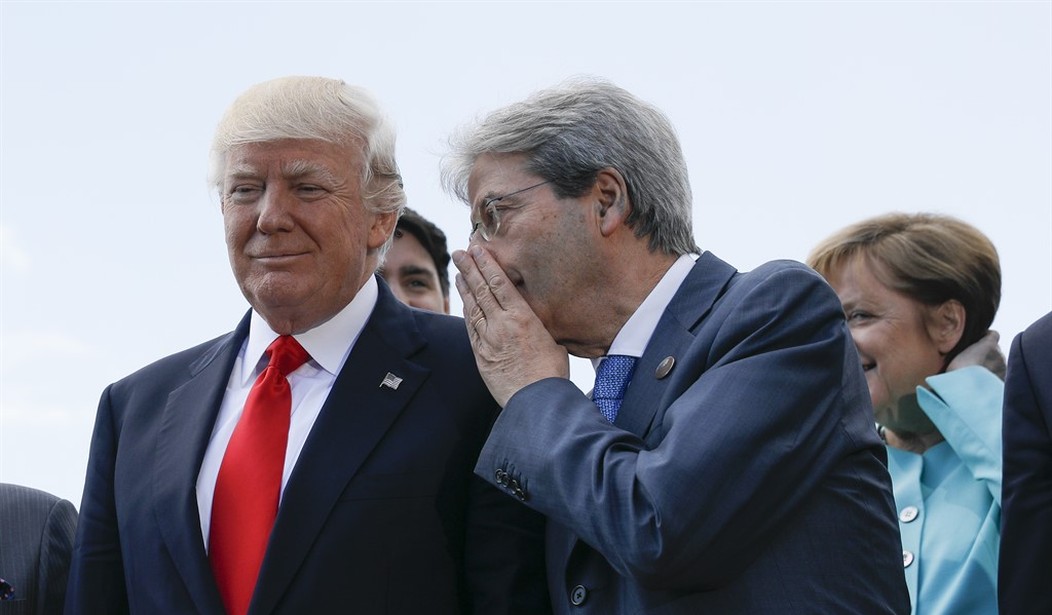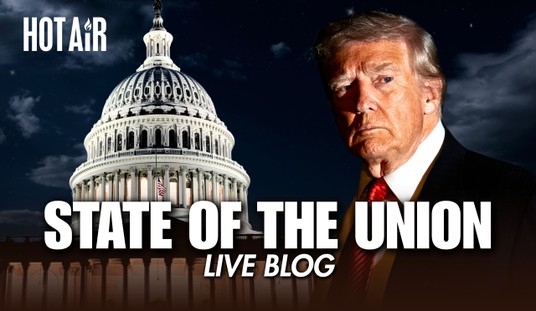Donald Trump wound up his first foreign tour by pushing off any decision on the Paris climate accord — to the consternation of the other G-7 members. After getting heavily lobbied to commit to the deal, Trump demurred, announcing on Twitter this morning that he’ll think about it for a while longer. The Italian prime minister serving as host to the meeting in Sicily issues a statement expressing frustration over the “open question” that prevented unity on the whole agenda:
https://twitter.com/realDonaldTrump/status/868441116726710272
The future of the United States’ involvement in the landmark agreement, which Trump repeatedly criticized as a candidate, was a sticking point at the Group of Seven summit in Italy that ended today, with the Italian prime minister pointing to it as an “open question” at the end of the summit’s first day on Friday.
“There is one open question, which is the U.S. position on the Paris climate accords. … All others have confirmed their total agreement on the accord,” Prime Minister Paolo Gentiloni said. “We are sure that after an internal reflection, the United States will also want to commit to it.”
Angela Merkel did not take the news well either, and offered a much less positive view of Trump’s position:
In remarks just now in Sicily, Merkel showed her frustration with Trump not committing to Paris climate deal pic.twitter.com/MTD7rI4PdH
— Anton Troianovski (@antontroian) May 27, 2017
During his campaign, Trump often scoffed at the theories of anthropogenic global warming, or “climate change” as it is now most often called, and actively opposed international commitments on CO2 emissions. He promised to unleash energy production in the US, and specifically pledged to protect the coal industry and its workers from hostile policies. Trump’s appointment of Scott Pruitt as EPA administrator was an early sign that he planned to keep those promises, as well as a signal to what he thinks about the Paris accord. His lack of embrace of Europe’s position on the agreement hardly comes as a surprise.
But fear not, Europeans! Trump’s chief economic adviser Gary Cohn told the press that Trump’s opinion on Paris is “evolving,” and that he’s been impressed with the arguments from other European leaders:
Though the president has yet to make a final decision, his chief economic adviser, Gary Cohn, indicated Friday that the president was growing more attuned to the European stance on the issue.
“I think he is leaning to understand the European position,” Cohn said when asked which way the president was leaning. “Look, as you know from the U.S., there’s very strong views on both sides.”
According to ABC’s report, national security adviser H.R. McMaster felt obliged to intervene and assure reporters that Trump would act on the best interests of the US. However, Cohn’s remarks certainly caught the ear of Keith Koffler, who reminds readers of what “evolving” means:
Uh oh. You know what that means. When a president’s views are “evolving,” that means he feels he needs to take his time flip flopping so that it doesn’t look too much like he flip flopped.
You know, like George H.W. Bush’s views on abortion “evolved” so he could be Reagan’s vice president. And Barack Obama’s views on gay marriage “evolved” once he felt it wouldn’t keep him from winning elections. …
Somehow, I’m pretty sure his views are not evolving towards hating the Paris accords even more.
Koffler also sends up some flares over other remarks from Cohn, reported yesterday by CNN:
“Coal doesn’t even make that much sense anymore as a feedstock,” Gary Cohn said, aboard Air Force One on Thursday, referring to raw materials that get converted into a fuel.
Cohn, who serves as director of the White House National Economic Council, instead praised natural gas as “such a cleaner fuel” — and one that America has become an “abundant producer of.”
While Trump rarely talks up the potential of renewable energy, Cohn sounds like a fan.
“If you think about how solar and how much wind power we’ve created in the United States, we can be a manufacturing powerhouse and still be environmentally friendly,” Cohn said.
Er … sure. That’s a startling statement from a close Trump adviser, but actions speak louder than someone else’s words, and Scott Pruitt didn’t go to the EPA to make coal passé. Besides, one doesn’t preclude the other — we can develop cleaner coal solutions and pursue innovation in renewables too.
Perhaps there is a simpler reason for all this evolution on the Paris accord, which is that it’s toothless. Unlike Kyoto, which tried for a legalistic top-down approach to enforcement, the Paris accord basically allows each nation to write its own rules, and then decide what enforcement and reporting will look like. The idea is that nations will compete to look super-greeny, and the laggards will get so ashamed of their foot-dragging that they’ll finally comply. There are some financial obligations, such as to provide a combined fund of $100 billion a year for “climate finance” between 2020 and 2025, but there are no real consequences for fudging. The biggest risk in the US might be court action that uses the Paris language to force the government to abide by its plan, but the accord is not a treaty and does not therefore have the full force of law within the US.
This toothlessness turns the main Kyoto problem on its head. The US Senate rejected Kyoto for a number of reasons, but mainly because rogue nations like China and India not only didn’t have comparable emission limits, there was no chance of them getting punished for violations. No one believes China reports honestly on the issue, and the killer smogs of Beijing pay testament to that lack of credibility. Instead of fixing that problem by imposing comparable limits and credible enforcement, the Paris accord just eliminates punishment entirely, adopting finger-wagging as the primary disincentive.
Trump may be evolving, but it might be an evolution to a position that the Paris accord isn’t worth the diplomatic headaches of opposition.









Join the conversation as a VIP Member